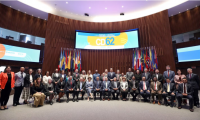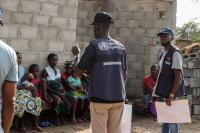4th RETS-CPLP Regular Meeting: an overview of the training and work of technicians in the community countries
During the 4th Regular Meeting of the Technical Health Schools Network of the Community of Portuguese-Speaking Countries (RETS-CPLP), held on November 12 and 13 in Rio de Janeiro, representatives of the countries of the CPLP presented the scenario of Primary Care (PHC) in their health systems. In addition, RETS-CPLP members approved the new Network 2019-2022 work plan and confirmed EPSJV/Fiocruz as their coordinating institution.
Presentations show diversity among countries and common problems

António Luis, from the Ministry of Health (Minsa) of Angola, gave a brief history of technical training in health in his country. According to him, by the colonial period, health training was predominantly auxiliary, in basic courses. The mid-level health education began in 1966/67 and was interrupted in 1975. In 1979, almost four years after the National Independence, the Ministry of Health with the Ministry of Education created the Comandante Bula Mid-level Health Institute in the province of Bié, with the purpose of training Medical Technicians of Medicine. Since then, several institutions have been created to be responsible for courses “Mid-Level Technical”, for initial training; 'Promotion' courses, to transform auxiliaries into middle-level technicians; 'Post-Media Specialization' courses, mainly for technicians already inserted in the NHS; and develop ongoing training for teachers and non-teachers. According to António Luis, one of the great challenges of Angola is teacher training, in order to improve the quality of training of technicians.
The presentation of Brazil highlighted the Network of Technical Schools of SUS (RET-SUS) and the Family Health Strategy (“ESF - Estratégia de Saúde da Família”), which revolutionized PHC in the country. In family health teams, auxiliary and technical nurses and oral health, in addition to Community Health Agents, play a key role. According to Marília Tolentino, from the Ministry of Health's Secretariat for Labor-Management and Health Education (SGTES), PHC reaches 67% of population coverage in Brazil.
Cape Verdean representative Serafina Alves of the Ministry of Health and Social Security (MSSS) highlighted the importance of PHC in national health policy and the role of insurance and health plans in providing PHC services. With many details, she spoke about the network of attention in the country and the composition of the health teams in the different establishments that make up the network. As difficulties, she emphasized the lack in Cape Verde of institutions for specialized training in Health; the insufficient number of technicians in various areas for replacement during the training period; and the high direct and indirect costs for the training of health technicians abroad.
For Guiné Bissau, the current director of the National School of Health (ENS), José de Pina Adelino, spoke. According to him, from 2009 until now, the School trained more than 1400 technicians in the courses of General Nursing, Pharmacy, Laboratory, Midwife, Promotion of Nursing, Promotion of Laboratory and Radiology. "Despite the advances, there are still a number of challenges to be overcome by ENS, in terms of its staff, infrastructure, and resource mobilization, among others", he said.
Representing Equatorial Guinea, present for the first time at the RETS-CPLP meeting, Manuel Nguema Ntutumu, from the Ministry of Health and Social Welfare (MSBS), showed the evolution of health training in his country. "Until 1971, only Nursing Assistants and Community Agents were trained internally. The other professionals had to be trained abroad. In 1971, the National School of Health and Environment was created to be responsible for the training of nurses. From 1983 to 1997 begins the middle-level formation of Sanitary Technical Assistants (ATS). Currently, all health training institutions are linked to the National University of Equatorial Guinea, but training abroad is still necessary", he said.
The Director of Human Resources of the Mozambican Ministry of Health (Misau), Bernardina de Sousa, explained that it is up to Misau, through the National Directorate for the Training of Health Professionals (DNFPS), to develop activities to improve the workforce and quality of training of health technicians. She said that Mozambique has 11 provinces that include 31 technical mid-level training schools in the private sector and 18 in the public sector. On this context, the country offers 18 technical mid-level courses in the most varied areas, among them, nursing, general and preventive medicine, instrumentation, health statistics, and community management. Bernardina affirmed that with the 2016-2020 National Training Plan the courses were selected for each institution. "We think it is the best to reflect about the specialty of each institution, and what they have to offer the best. If we want quality, we need to focus on it. Many of the courses are held, but they do not have the conditions to be a quality course".

Bernardina pointed out that in Mozambique the health system aggregates the primary, secondary, tertiary and quaternary levels, as well as the community health level that brings together the Elementary Polyvalent Agents (EPAs). According to her, about 95% of the population has access to the primary level, which includes physicians, maternal and child health nurses, medical technicians, and preventive medicine, among others. "This is where we have to create conditions to give attention to quality for the population. In all our health facilities, including in the countryside, there is at least one doctor", she concluded.
Ana Almeida, a professor at the Lisbon Higher School of Health Technology (ESTeSL), characterized Primary Health Care (PHC) in the context of health policy in Portugal. According to her, PHC in the country has a public health dimension because they represent the gateway to the National Health System and because they also have strong prevention functions. “PHC is an essential tool for improving the health of the population and for combating health inequalities, because of their population coverage and almost gratuitousness. Population coverage to PHC in 2018 reached 100%", she said.
According to the teacher, the PHC teams are allocated at Regional Health Administrations and Local Health Units, which have doctors, nurses and senior technicians in the areas of Diagnosis and Therapeutics. "In these teams, we have about 1,600 technicians, who are higher level, what in Brazil, is called technologists. They perform activities related to biomedical laboratory science, medical and radiotherapy, clinical and biosynthetic physiology, therapy and rehabilitation, oral health, pharmacy, among others", she said.

The experience of East Timor, country that participated for the first time in a RETS Meeting, was presented by Ivone de Jesus of the National Institute of Health. According to her, everyone has the right to health and medical and sanitary assistance and it is up to the State to promote the creation of a universal national health service and as far as possible, free of charge. "The National Health Service proposes to be decentralized and participatory management", she said. Ivone highlighted the Health Policy in the East Timor Family, which formally emerged in 2009 as a public strategy integrated with the Primary Health Care package and inspired by the Alma Ata Declaration. Family Health has integrated community health services with home visits of a regular and integral nature, community health centers, health centers, service stations, as well as hospitals. "We have 338 health posts, 72 community health centers, and only six hospitals. In the country we have 894 general doctors, 1272 nurses, 619 midwives, and 634 technicians", she said.
Considered as one of the youngest countries in the world, having its independence in 2002, East Timor faces many challenges, such as the lack of human resources, infrastructure, and teaching materials, as well as deficits in teacher training in quantity and quality. "The training focuses mostly on doctors, nurses, and midwives, who are usually funded by partner countries that support our health programs. But many professionals are trained outside the country and we have not yet established the equivalence standard for validating these curricula", she lamented.
Election and Work Plan
In taking stock of RETS-CPLP's nine-year existence, Geandro Pinheiro, member of the International Cooperation team at EPSJV/Fiocruz, who coordinated the meeting, highlighted the effort to build training proposals, especially those aimed at teaching and the various strategies related to the communication plan. Among the challenges, Geandro pointed out that the agenda of health technicians, despite being the most significant portion among workers within health services, is still quite invisible. "There are advances, but still far short of who is the health technician. We need to have concrete actions to give visibility to the policies and work schedules that include the category. In addition, strengthen political alliances and articulation among Network members, expanding the capacity to undertake joint projects and increase funding capacity. A network only materializes with the action of all members", he said.
On the 13th, RETS-CPLP members discussed and approved the Network's work plan for the next four years and confirmed EPSJV/Fiocruz as the coordinating institution for the same period.
The RETS-CPLP Work Plan established ten actions aimed at strengthening the training capacity of technical workers for the national health systems of the member countries, with emphasis on Primary Health Care: development and assessment of strategies for training teachers to work in the national training systems of health technicians, through bi and multilateral technical cooperation; strengthening communication and interactivity to and from the Network through the incorporation and use of educational, information and communication technologies; promotion of exchange and academic mobility in the area of technical training in health, including teachers, students and researchers, as a way of consolidating the Network.
Links and documents:
- Declaration of Rio de Janeiro
- Meeting Minutes
- Annex 1 - List of participants (coming soon)
- Annex 2 - Programming and Term of Reference (Portuguese, Spanish)
- Annex 3 - Work Plan RETS-CPLP 2018-2022 and Minutes 4th Ordinary Meeting of RETS-CPLP. (Portuguese)
- Annex 4 - Regional Action Plan for Latin America 2018-2022
- Annex 5 - RETS Communication Work Plan 2019-2022
- Annex 6 - Work Plan RETS 2019-2022
- 4th RETS General Meeting discusses primary health care (New)
- Seminar '40 years of Alma-Ata and the role of health technical workers in the implementation of universal health systems'
- From Declaration of Alma Ata to Declaration of Astana: advances or setbacks? (new)
- Presentation - Paulo Buss (Portuguese)
- Presentation - Isabel Duré (Spanish)
- Seminar's videos (Spanish and Portuguese)
- 4th RETS-CPLP Regular Meeting: an overview of the training and work of technicians in the Community countries (new)
- Presentation RETS-CPLP (Portuguese)
- Presentation Angola (Portuguese)
- Presentation Brazil (Portuguese)
- Presentation Cape Verde (Portuguese)
- Presentation Guinea Bissau (Portuguese)
- Presentation Equatorial Guinea (Spanish)
- Presentation Mozambique (Portuguese)
- Presentation Portugal (Portuguese)
- Presentation Timor Leste (Portuguese)
- The different faces of the work of health technicians in Latin America (new)
- Presentation RETS América Latina (Portuguese)
- Presentation Argentina (Spanish)
- Presentation Bolivia (Spanish)
- Presentation Brazil (Portuguese)
- Presentation Chile (Spanish)
- Presentation Colombia (Spanish)
- Presentation Cuba (Spanish)
- Presentation El Salvador (Spanish)
- Presentation Paraguay (Spanish)
- Presentation Peru (Spanish)
- Presentation Uruguay (Spanish)



